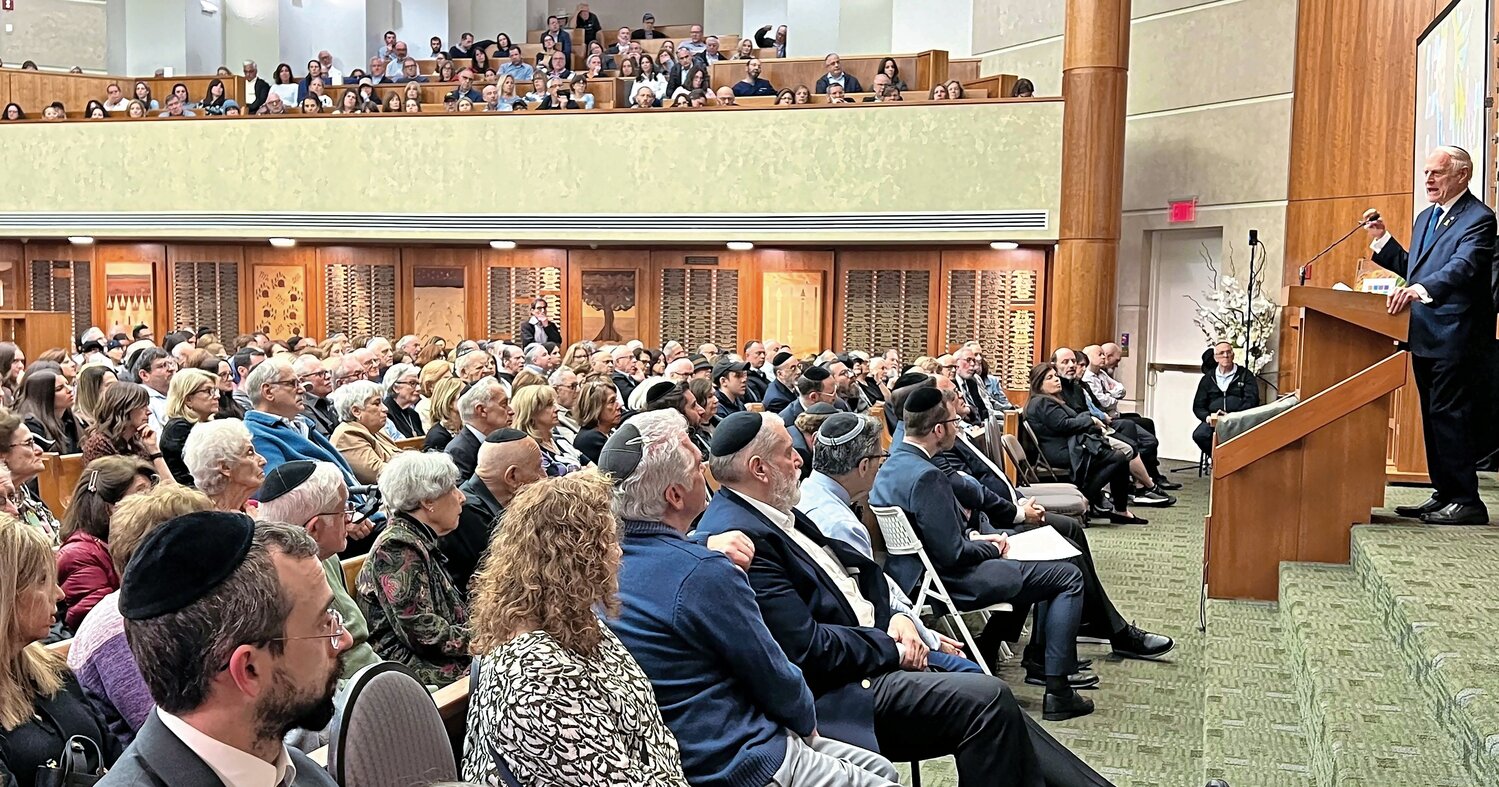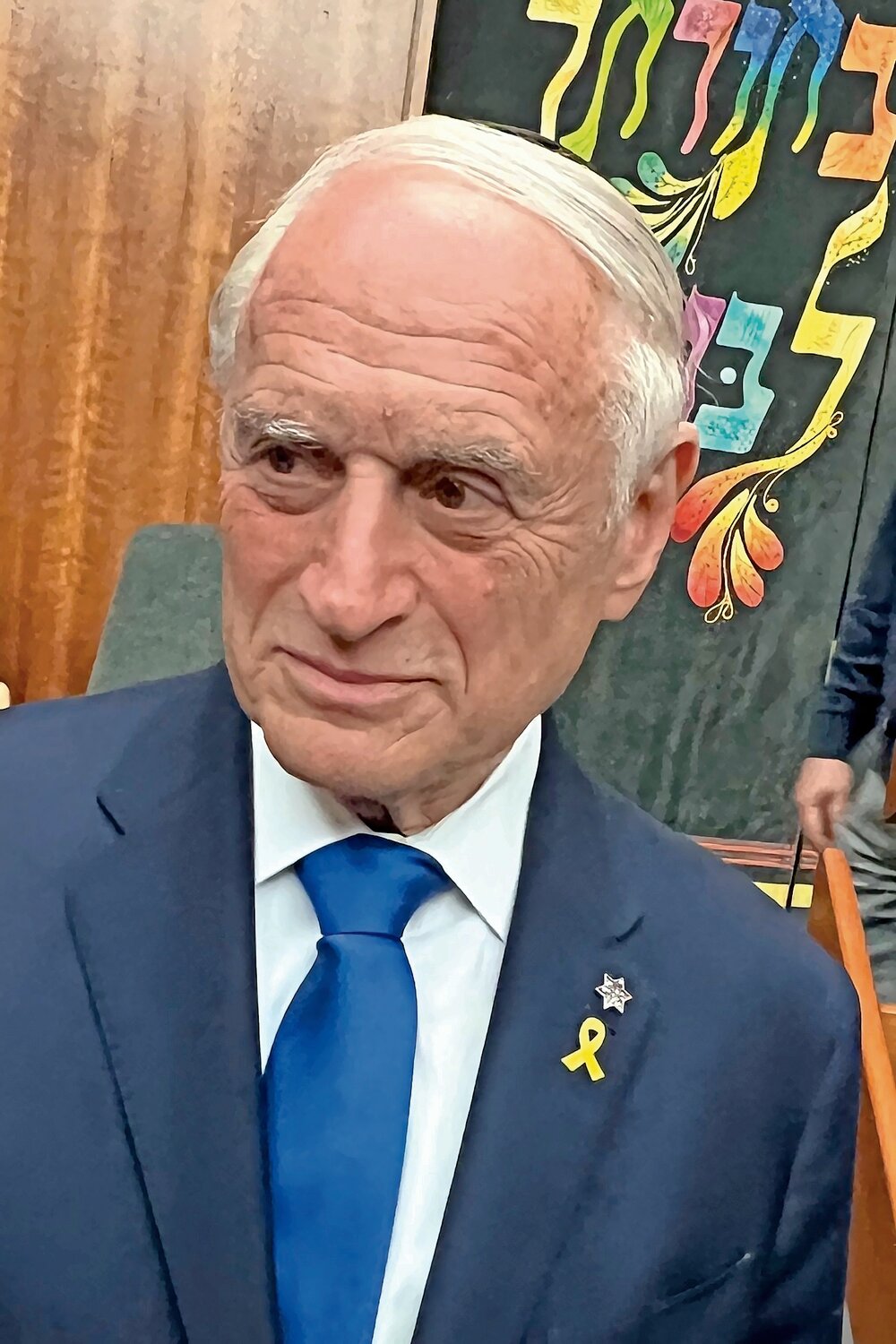Our grandchildren will judge us
They’ll ask, ‘What did you do after Oct. 7?’ Hoenlein tells YIW
Just as many have asked, “Where were America’s Jews in the 1930s and during the Shoah?,” our grand-children will ask, “Where were you after Oct. 7?”
That’s the message voiced Monday night by Malcolm Hoenlein to a full house at the Young Israel of Woodmere, in an event bridging Yom HaZikaron and Yom HaAtzmaut.
“This is a time when each of us has to make the declaration — ‘no more, never again’,” Hoenlein said. “Make that promise to your grandchildren and their grandchildren, because they will turn back and judge you. They will ask what did you do, just as we judge the generation of 80 years ago and ask what did they do?”
Hoenlein, vice chairman emeritus of the Conference of Presidents of Major American Jewish Organizations, has been an articulate Jewish communal leader for decades.
“Today you know everything,” he continued. “You see it on your computers, you can get access to all the information instantly. The question is what do you do about it.
“Do you rise to the challenge? And will you bring many others with you — so that when your grandchildren look back and they judge you and ask you what did you do at that critical time in Jewish history, they will praise you and thank you for making it a safer world for them.
With the very existence of the Jewish state and the lives of its seven million Jews threatened, and with life in American Jewish communities becoming more precarious, “you can’t do everything, but you can do something. This is a time when each of us is going to be measured.”
Hoenlein referred to Oct. 7 as “a watershed in Jewish history” whose full impact has yet to be felt.
When he addressed the Young Israel of Woodmere more than 10 years ago, “I spoke about the danger of antisemitism, about what was happening on campuses and about Iran. People were skeptical and came to me and said, we don’t experience it. This was 10 years in the making. This didn’t just happen — neither what happened on the borders of Israel or what’s happening on the campuses in America.”
Not long after Oct. 7, Hoenlein visited Sderot, the closest city to the Gaza border. He said he didn’t want to go, but wounded soldiers insisted he needed to be a witness so he would later be able to personally recount what had happened there.
“I saw it,” he began, describing how he was escorted “by a young soldier who said, don’t step there because we’re looking for DNA, they burned a little baby in that location.”
The soldier asked him to follow, but “I couldn’t walk past this brick wall, which wasn’t there. It was the smell, something so strong I literally couldn’t penetrate it. He pulled me through it and opened the door of a truck and there were already 40 bodies that they picked up.”
Hoenlein said he began to understand “in ways that we could not before” what his grandparents experienced in 1943 when they were sent to concentration camps.
“This is not just about Israel and it’s not just about Jews,” he said. “We are bit players — this is about the future of the world. … Victory over Hamas is an essential not just for Israel’s survival, it’s a moral imperative, a security demand for the future of the world.”
“This is not a time for compromise or appeasement with such evil as we have witnessed,” he said, adding that although some have turned against the Jewish people and the Jewish state, most are still standing with us, waiting for us to lead.
“Every Arab leader says to me, in every conversation over the last six months: decimate them. Don’t listen to what we say, just kill them all. Because if not, we’re next — Egypt, Jordan, Saudi Arabia, Bahrain, UAE. Every ally of the United States, they know that they are next in line.”
Even in Iran, the people are with us, he said, reporting that when attendees at a soccer match were asked to pause for a moment of silence for Palestinian victims, “tens of thousands started blowing horns and screaming ‘death to the dictator, death to the dictator.’ Their greatest disappointment is that nobody in the West cares.”
Meanwhile, “the blasphemous lies continue, and unfortunately too many in our own community, too many of our own young, believe them,” Hoenlein said,
“Teach our children … educate them about the problems because believe me, the kids from the best homes, in our best institutions, don’t know. We tested, they can’t answer. And when they have doubt, we have to worry.”
Forty-percent of young Americans don’t believe the truth about Oct. 7th, and 25% don’t believe the truth about the Holocaust, he said.
As for the charge that Israel is commiting acts of genocide in Gaza, Hoenlein asked how many people were in Gaza in 1967, when Israel occurpied the territory. Four-hundred-thousand, he said; now there are 2.1 million. “They’re really bad at genocide.”
Many young people and “falling victim to the lies [and] misrepresentations,” with big lies spreading “in nanoseconds on the internet.”
Hoenlein said he was inspired by the wounded IDF soldiers he met, most of whom told him that would like to rejoin the fight.
“We should stand up proudly, not hide our Jewish identity, not hide our Jewish symbols, not hide our affinity for Israel,” he said.
And if President Biden reasserts his support for Israel, “The American people will stand with him.”
Before Hoenlein spoke, those assembled heard testimony about hostages and about fighters in the IDF, and prayers were recited.
Nassau County Executive Bruce Blakeman praised his police department and criticized other officials.
“Some of our elected officials have betrayed us,” Blakeman said. “We must remember those who supported us in our darkest times, and those who have not.”
He contrasted Nassau County’s approach to anti-Israel protests with that seen elsewhere.
There’s “a very different policy in other parts of the country,” he said. “If protesters want to come and exercise what they call the First Amendment right to free speech, we give them a place on the sidewalk. If they step off the sidewalk, our police officers will politely tell them to get back on the sidewalk. If they do not, they’re arrested. There are no tents, there’s no occupation, there’s no harassment, there’s no violence.
“This is a standard that we must hold throughout America.”









